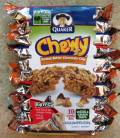Connecticut AG slams industry over BPA
UK retailer sheds cereal cartons
Tyson settles water-treatment suit
Quaker bars held together with minimal material
Swedish pâté tubs come in pairs

by Pan Demetrakakes
Executive Editor
The recession is eroding consumer loyalty to national food brands, even in categories like organic foods that otherwise remain strong, according to recent surveys.
Just under half (48%) of consumers remained loyal to the average branded packaged-goods product last year, according to register data analyzed byCatalina Marketing. Catalina operates Pointer Media Network, which prints and distributes coupons at grocery cash registers tailored to consumers’ purchases.
Pointer analyzed purchase data from 32 million consumers relating to 685 leading consumer brands from 2007 to 2008. Some brands retained loyalty, like Coke Classic (75.3%) and Thomas’ English Muffins (76.3%). But others, like Cheerios (34.6%), experienced a steep drop-off. Overall, only about 40% of the brands studied maintained their loyalty.
The study defined “highly loyal consumers” as those who bought a single brand for at least 70% of their purchases within a given product category. The results showed that:
• 48% of highly loyal consumers stayed that way.
• 19% reduced their loyalty.
• 33% completely defected to another brand in the same category.
A Catalina spokesperson told Reuters that the decline in brand loyalty “likely could” become steeper in 2009, especially as major food retailers strengthen their private label offerings.
Organic foods are maintaining their popularity, but even there, the recession is causing changes in buying habits.
A survey byMambo Sprouts Marketing, a consulting firm that specializes in organic products, showed that 87% of respondents remain committed to eating healthily, and 55% would not forgo products like natural and organic products, vitamins and environmentally friendly products.
Anothersurvey, by the Organic Trade Association and Kiwi magazine, showed that 73% of families buy organic products at least occasionally, and that 31% are actually buying more organics now than a year ago.
However, of the 45% of consumers who reported in the Mambo Sprouts survey that they’re adjusting their organic buying habits:
• 67% said they’re being more selective.
• 65% said they look for sales on organic products.
• 50% said they use more coupons.
• 48% said they’re buying more private-label organics.
In addition, 50% of all respondents said they buy private-label organics occasionally, and another 38% said they do so regularly. Since the recession started in 2007, 26% said they’re buying more private-label organics.
TOP DEVELOPMENTS
Connecticut AG slams industry over BPAThe attorney general of Connecticut has accused leading food, beverage and packaging companies of “fear tactics, political manipulation and misleading marketing” in fighting regulation of bisphenol-A (BPA). Attorney General Richard Blumenthal sent a letter to Crown Packaging Corp, Alcoa, Del Monte Foods, the Grocery Manufacturers Association (GMA), Coca-Cola and the North American Metal Packaging Alliance (NAMPA) referencing a meeting that took place in Washington, D.C. on May 28. Blumenthal accused the industry of conspiring to cover up the dangers of BPA, a hardening additive which is extensively used in can linings and other packaging. Blumenthal led the effort in Connecticut to limit the use of BPA in baby bottles. The GMA and NAMPA denied that any such conspiracy exists or that the May meeting had any such purpose.
UK retailer sheds cereal cartons
British supermarket chain Sainsbury’s will do without paperboard cartons for its store-brand ready-to-eat cereals, the company announced recently. All Sainsbury’s RTE cereals will come in flexible packaging, an initiative that is being phased in starting with Sainsbury’s Rice Pops. The move comes as part of the retailer’s drive to cut one-third of all its packaging. “When it comes to cereal, our customers asked us why they need to be in a box as well as a bag when you can just print all the information on the bag,” Stuart Lendrum, the retailer’s head of packaging, toldFoodbev.com.
Tyson settles water-treatment suit
Tyson Foods has settled a class-action lawsuit over water treatment of chicken products in part by agreeing to donate $2.3 million in product to food banks in Illinois. The suit, filed in Madison County in 2001, alleged that Tyson engaged in deceptive practices by using immersing chicken in water, causing it to gain water weight. While not admitting wrongdoing, Tyson agreed to donate product to food banks in the Feeding Illinois network. The terms also include a $2 million fund to settle claims by individual class members and $750,000 in attorney’s fees.

NEW PACKAGES
Quaker bars held together with minimal materialA club-store package developed by the Quaker division of PepsiCo allows granola bars to be held together and dispensed without paperboard. The Rip n’Go package holds together 10 bars, at 24 grams apiece, with a flexible film overlay. Adhesives and laser scoring on the overlay allows consumers to rip away individual flowrapped bars while the remaining ones stay together. The packaging advertises that the set-up saves “the equivalent of 6,000 trees per year.”

Liver pâté sold in Sweden now comes in two connected tubs, the better to appeal to single households. Food processor Pastejköket markets its pâté in 75-gram tubs fromSuperfos. The polypropylene tubs, trade-named SuperSeal, are reclosable and have a low oxygen transmission rate for extended shelf life.
